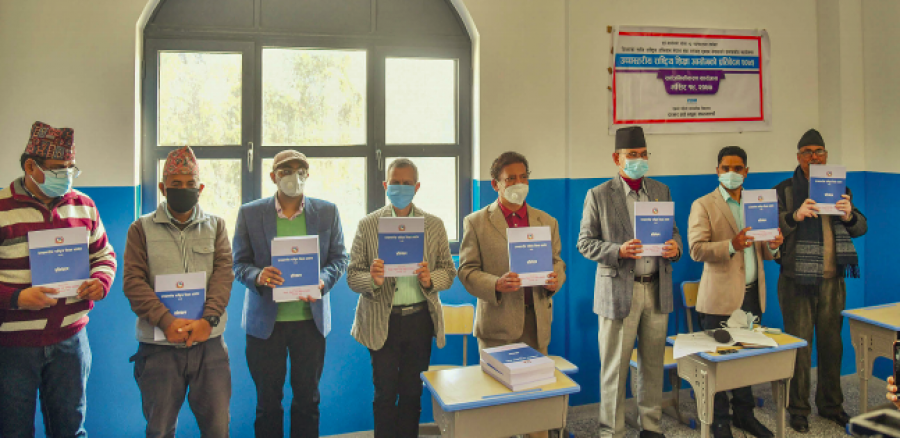National
Education ministry continues its action against two organisations for publishing a commission report
A day after it wrote to the home ministry to initiate legal proceedings against the two for violating copyright provisions, it asks donor agencies about their ties with them.
Binod Ghimire
The fallout of the publication on Friday of the nearly two-year-old report on the education sector continued Monday with the Ministry of Education dispatching letters to the United Nations, World Bank and 14 other international non-governmental organisations expressing its displeasure over their support to the publication.
The National Campaign for Education and Global Action Nepal, two organisations working in the education sector, had financed the publication of the report on Friday as per the wish of a majority members of the 25-member committee.
“Yes, we have written to the probable funding partners of the two organisations,” said YP Acharya, an officer at Development Aid Coordination Section of the ministry confirming the letters were sent. “The donor agencies shouldn’t be funding the organisations that carry out unauthorised activities.”
The ministry had on Sunday decided to stop its partnership with the two organisations and wrote to the Ministry of Home Affairs for a legal action for violating its copyright.
The ministry has accused the report of misusing its name and stamp in the High-level National Education Commission’s report and violated the copyright by making public the government’s document without its permission.
The report was prepared by a team of 25 members formed in August 2018 and 13 of them were for publicising the report.
UK Aid and the British Council were other international organisations among the 16 the Ministry of Education wrote to Monday seeking a detail about the programme they were conducting in partnership with the National Campaign for Education and Global Action Nepal and scrap them with an immediate effect.
The leaders of the organisations, however, said they had just supported the members of the commission to publish the report and the decision to use the ministry’s name and logo was made by the members themselves.
Dilli Ram Subedi, chairperson of the National Campaign for Education, said the government is marching ahead with a motive to close their organisation.
“It is unfortunate that one after another actions are being taken without giving us a chance for clarification,” he told the Post. “We are having consultations for our response. I think the only option left for us is to knock on the judiciary’s door.”
Though NGO Federation, Nepal, an umbrella body of the non-government organisations across the nation, is yet to come up with its official position, its chair Jit Ram Lama said the government can not stop civil society organisations from access to state resources and the report is a state resource.
“The two organisations need to correct their actions if they use the logo and the name without permission,” he told the Post. “However, it is wrong of the government to write to the donors to stop its funding and create problems in the operation of the two organisations.”
The commission was led by Education Minister Giriraj Mani Pokharel comprising education experts, representatives from the teachers’ and private schools’ associations and officials to recommend the government on its education policy.
The commission had submitted its report to Prime Minister KP Sharma Oli on January 15, 2019. A majority of the members 13 of the 25 decided to publicise the report after the government turned down their repeated request to bring the report to the public domain.
Baburam Thapa, one of the 13 members of the commission who wanted the report made public, said the government should take action against the members, not against the two organisations. He said the members of the commissions took every decision regarding the publication of the report.
“The ministry’s actions are motivated toward curtailing right to information. We suggest it to immediately roll back its decision,” he told the Post. “The government should work towards implementing the report rather than trying to intimidate the non-government organisations.”
The 13 members also issued a statement on Monday saying the published report has carried the ministry’s name and logo as it is purely a copy of the one presented to Prime Minister Oli.
Around Rs 20 million of the government was spent while preparing the report.
Members of the commission present during the programme organised to make public the report had said it was up to the government to accept the recommendations fully or partially. However, hiding the report was a pure act of dishonesty and an example of lack of accountability, according to them.
They have been saying that the government, at the behest of the private schools, kept the report a secret.
Concluding that private education had become a profit-making sector, the commission had recommended that private schools be transformed from ‘for-profit’ into ‘not-for-profit’ and they be given 10 years to undergo such a transformation.
The commission, according to its members, made its recommendations based on Article 31(2) of the constitution, which makes the state responsible to ensure compulsory basic and free secondary education for all. The commission said that leaving private educators to “generate profit”, as they are doing at present, would be tantamount to a breach of the constitution.
Private schools, understandably, have been objecting to the commission’s recommendations.




 13.12°C Kathmandu
13.12°C Kathmandu














